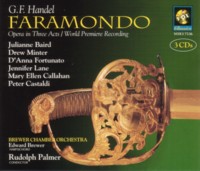Faramondo
was composed in late 1737 after the end of Handelís Covent Garden period, and
after severe health problems which forced him away from the public life for
months. We can consider Faramondo as the first of Handelís last Italian
operas. The original libretto - composed in 1698 for Carlo Francesco Pollarolo
- is by Apostolo Zeno. Handel uses an anonymous adaptation - 700 of the 1400
verses are cut - from the version used by Francesco Gasparini in 1720. Zeno
was Metastastio's predecessor as court poet in Vienna, but considered himself
a historian rather than a librettist. Thus one of his influences with the
appearance of opera seria at the end of the 17th century and beginning
of the 18th century is the preference for historical subjects. Pharamond - or
Faramond - is now considered a legendary character who lived in the 5th
century, but in that time he was thought of as the first King of France.
The story represents numerous love and warlike
relationships : Faramondo is at war against Gustavo and has already killed one
of his sons. Gustavo has two other children, Adolfo, loved by and in love with
Clotilde - Faramondoís sister - and Rosimonda, loved by and in love with
Faramondo. The drama is built on the fact that Gustavo and his children swore
to avenge their son/brother and that both Gustavo and Gernando - a third king
first allied to Faramondo - fall in love with Clotilde. The conflict between
love and duty, particularly fundamental in opera seria, is thus very
strong for several of the characters. Faramondo was composed and first
performed before the famous Serse and for the same cast, with the
castrato Caffarelli singing the main parts in both of them. It is an opera
in which the combination of love and a particularly
exacerbated heroism offer very strong dramatic potential. Handel
totally accepts this heroism, and it is not the kind of score which offers
beautiful lamenti but rather is a hymn to heroism and love as idealised
vision of life. The contrasts are really efficient thanks to both a fine
musical setting that is sometimes demonstrative yet never artificial, and the
effect of a totally underestimated libretto.
As is often
the case in recordings of Handel operas produced by John Ostendorf, there are
several unfortunate cuts - quite important in the recitatives in this work -
but the singers are totally involved in their parts and definitely try to
express something with both music and text, even if not always vocally at
ease. Bass Peter Castaldi sings many low notes an octave higher, Drew Minter
is not at ease in high notes but very convincing as the villain, and DíAnna
Fortunato - the main weak point of this cast - offers a dry voice and mediocre
technique to the main part. Mary Ellen Callahanís light voice fits well the
character of the young Adolfo and Jennifer Lane offers the best performance of
the cast as Rosimonda. Julianne Bairdís singing is quite representative of the
recording as a whole: although not always accurate, particularly in high
notes, the result is often charming and pleasant to listen to. It is
interesting to note that in the duet Clotilde/Adolfo in act III they have
inverted the parts; thus J. Baird sings the second one. Most of the parts ask
for long voices with a wide range and strong technique, but we can be grateful
that the performers believe in both music and text enough to partially enable
the listeners to perceive the potential of the work (since Handel's
performances in 1738 it has only ever been staged twice: at Halle in 1976 and
at Reading University in 1981). The inclusion of movements from the
concerto grosso op.6 nį.4 at the beginning of the last two acts (two
movements before act II and two movements before act III) is regrettable: each
act already has its own sinfonia, and although the concerto movements
fit quite well musically, they do not fit the dramatic mood.


